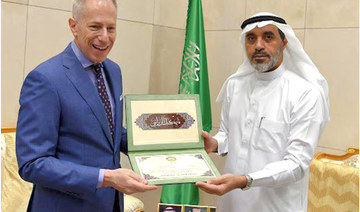RIYADH: Saudi Arabia’s Ministry of Health is widely using coronavirus disease (COVID-19) active screening to contain the spread of the virus, as the number of infections reached 11,631 cases on Tuesday.
The screening aims for early detection — over 150 field teams from the ministry are visiting areas, homes and residential buildings with suspected cases, and mass screen people as a precautionary measure.
Minister of Health Tawfiq Al-Rabiah said that the ministry had noticed an increase in the number of people infected with COVID-19 during the past three days due to active screening in crowded areas.
Dr. Fadwa Al-Ofi, an infectious diseases consultant, said: “By detecting these cases, we can isolate them and prevent the spread of infection to the community.”
She added that most positive cases were asymptomatic or only showed mild symptoms. “The target screening is done in high-risk areas that have a lot of cases, and crowded areas,” she said, mentioning that as of Sunday, 82 percent of cases had been identified through active screening.
The Health Ministry has noticed an increase in the number of people infected with COVID-19 during the past days due to active screening in crowded areas.
Tawfig Al-Rabiah, Saudi health minister
According to the ministry’s spokesman, Dr. Mohammed Al-Abd Al-Aly, testing has proven effective in limiting the spread of COVID-19.
He noted that the duration of testing surveys in targeted neighborhoods ranged from days to weeks according to population density, number of housing units, residential interaction, and the number of cases discovered.
Over 200,000 tests have been carried out at the Ministry of Health’s laboratories and other leading institutions throughout the Kingdom.
According to Al-Abd Al-Aly, over 500,000 field medical evaluations have been conducted as part of the active screening, where teams carry out certain tests and evaluations to identify suspected cases.
He stressed that all the laboratories involved in conducting the tests were accredited by the National Center for Disease Prevention and Control.
“They have a seven-person team, and I was fortunate to join them in their expeditions,” Dr. Sharif Hala, a scientist who has been accompanying the infection control group from the Ministry of Health, told Arab News.
HIGHLIGHTS
•More than 500,000 field medical evaluations have been conducted as part of the active screening, where teams carry out certain tests and evaluations to identify suspected cases.
•All the laboratories involved in conducting the tests were accredited by the National Center for Disease Prevention and Control.
The team dispatched from the Ministry of Health is multilingual in order to communicate fully with people being screened, he said, and mostly screening was passing without incident. 
However, there were some cases where patients refused to be tested, he added. “When a patient refuses to give their sample, they explain very calmly the reason … but most of the people didn’t refuse.”
The samples are collected and then placed inside bags with two different closures that are then secured carefully inside a box.
“They number everything very methodically. So, I have full trust in them … I was really impressed by the way that they were trained and the number of items that they have. They spare absolutely no expense in terms of gowns and masks,” he added.
For protection purposes, the Ministry of Health provides two cars accompanied by three police cars for when an incident arises.
Hala emphasized the importance of active swabbing, saying: “Active swabbing is extremely necessary because you’re stopping the virus in its tracks.”
He added: “The hospitals are not full at all. I have seen it, there is a lot of capacity for people. Specific neighborhoods and specific cities are being closed or locked down because they (the ministry) found that the transmission came from there. And this is where we come and help and research.”
Dr. Afrah Al-Somali, an infectious diseases consultant at King Abdullah Medical Complex in Jeddah, said: “Most but not all of those people living in crowded areas are able to seek medical advice in the early stages, until they reach later stages of the disease.
“Active swabbing helps to discover more cases as early as possible, isolate them and give them the proper care and support to stop the vicious cycle of infecting others.”




























